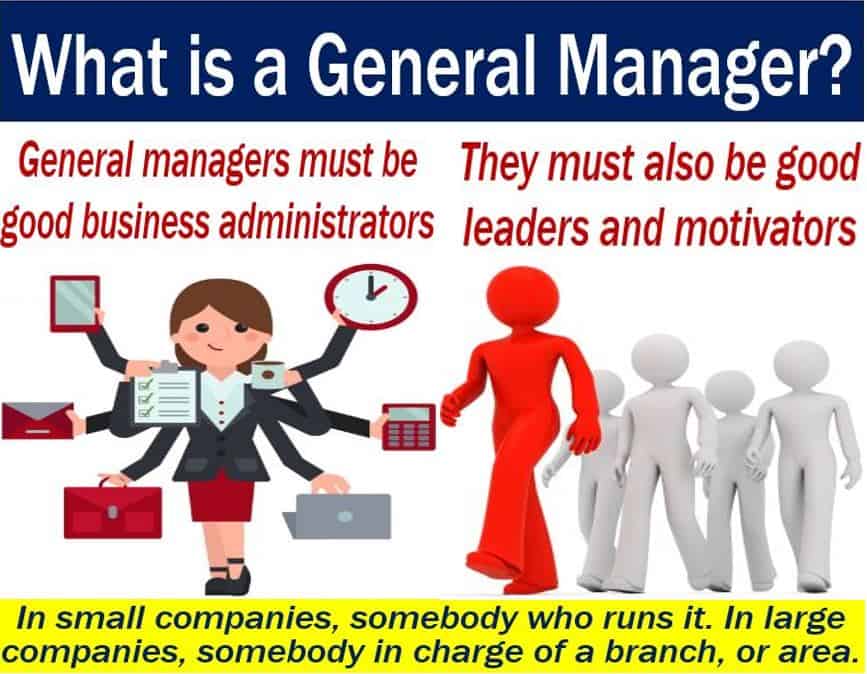A General Manager or GM is someone in charge of managing a business or a certain area of a company. A GM makes sure a business works efficiently and is generating as much profit as possible.
Do not confuse the term with Chief Executive Officer or Managing Director. General managers are further down the management ladder.
General managers usually rank above most other employees in a company. However, in some cases, they can be below corporate-level executives. A general manager typically answers to either the business owners or the corporate executives.
General Managers have the responsibility of coordinating, planning, and making decisions that are in the best interests of the business.
Their responsibilities are to take care of the daily operations of the business and create and implement strategies designed to help grow the business. They also manage staff and projects in the company. Additionally, they make strategic decisions.
The duties of a general manager will depend on the type of company and its size. What they do also depends on the company’s organizational structure.
General manager – small and large companies
In a small business, they are in charge of more parts of the company compared to general managers of large businesses.
For example, in the hospitality industry, a general manager of a big chain hotel can be in charge of managing the staff and departments.
In a small hotel, on the other hand, they have more roles, such as staff hiring, and marketing campaigns. In small hotels, general managers work on finance strategies.

General manager – skills
General managers must have good oral and written communication skills. They need to be problem solvers and able to think clearly and quickly under pressure.
They need to be good team players who know how to motivate employees. Additionally, a good general manager must have time management skills.
In most cases, employees can become general managers if they work hard and do a good job. They may, however, have to wait some time before a position becomes vacant.
They should have a university degree, and ideally a post-graduate qualification, such as an MBA. Degrees in accounting or management are also helpful.
In some sectors, to be considered for a general management position, the candidate must have experience in the industry. Some employers also require specialization in specific areas.
Exemplary leadership qualities are often sought after, as the role necessitates guiding teams towards achieving the company’s objectives efficiently. Continuous professional development is also key, as it enables general managers to stay abreast of the latest industry trends and management techniques.

Becoming a general manager?
If you would like to direct your career towards general management, you may find the following tips useful:
- Consider getting a post-graduate qualification. For example, an MBA (Masters in Business Administration) would be extremely helpful. There are also specialization courses in core management areas.
- Get involved or volunteer for projects where you can learn more about the company. You will also meet people, and in doing so acquire additional skills.
- Consider talking to your manager about job rotation, if it is available. You could also move into other departments. Working in different departments is useful because you will gain all-round experience.
“General Manager” – examples sentences
Understanding the multifaceted role of a “general manager” can be best illustrated through various examples of how the term is applied across different scenarios. Here are seven sentences that encapsulate the diverse contexts in which the term “general manager” is used:
- “The general manager of the manufacturing plant announced an ambitious plan to double production capacity within the next two years.”
- “At the annual board meeting, the general manager reported a significant increase in revenue, attributing it to the successful launch of the new product line.”
- “In response to the crisis, the general manager coordinated a cross-departmental effort to streamline operations and reduce costs.”
- “The general manager worked closely with the team to cultivate a culture of innovation and continuous improvement.”
- “During the charity event, the general manager emphasized the company’s commitment to community engagement and social responsibility.”
- “The restaurant’s success was largely due to the general manager’s focus on customer satisfaction and employee training.”
- “As a new general manager, she introduced a strategic vision that aligned with the company’s long-term goals for sustainability and ethical practices.”
